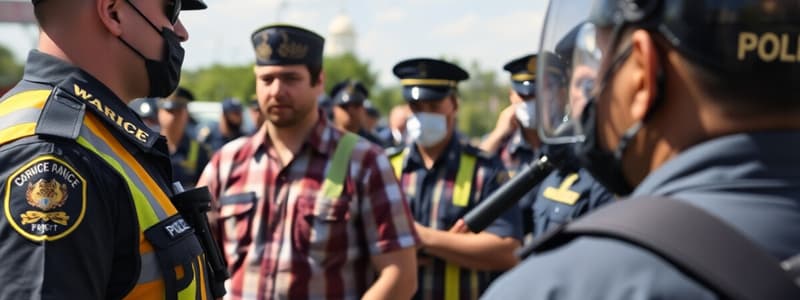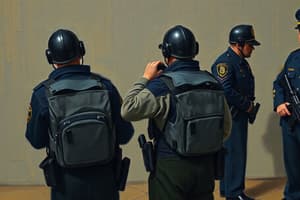Podcast
Questions and Answers
When may a deputy arrest someone for resisting arrest?
When may a deputy arrest someone for resisting arrest?
- If the person is suspected of committing theft and tries to pull away from the deputy. (correct)
- If the person does not immediately obey the deputy's order to stop. (correct)
- If the person pulls away briefly and is easily subdued.
- If the person tries to kick the deputy. (correct)
- If the person makes a minor attempt to pull away and enlists the help of bystanders. (correct)
A deputy is called to a convenience store for a report of theft. What must the deputy determine before taking a suspect into custody?
A deputy is called to a convenience store for a report of theft. What must the deputy determine before taking a suspect into custody?
- The amount of merchandise stolen.
- If the suspect cooperated with the shop owner's request to leave.
- Whether the store owner wants to press charges.
- The suspect's intent to deprive the store of the merchandise. (correct)
- Whether the suspect has a prior criminal history.
Under what circumstances can a deputy arrest a person for trespassing?
Under what circumstances can a deputy arrest a person for trespassing?
- If the property owner has filed a formal complaint against the trespasser.
- If the person enters a property without the owner's permission.
- If the person enters a property with the intent to commit a crime.
- If the person enters a property that has a 'No Trespassing' sign posted.
- If the person enters a property and refuses to leave after being ordered to do so by someone with authority. (correct)
A deputy is called to a scene where an individual is accused of refusing to pay their taxi fare. What should the deputy do?
A deputy is called to a scene where an individual is accused of refusing to pay their taxi fare. What should the deputy do?
A deputy observes a person stealing a bicycle from a bike rack. What action should the deputy take?
A deputy observes a person stealing a bicycle from a bike rack. What action should the deputy take?
According to the provided information, which of the following is a factor that a deputy may consider in determining probable cause?
According to the provided information, which of the following is a factor that a deputy may consider in determining probable cause?
Which of the following statements accurately describes "probable cause" as used in the context of arrest in this document?
Which of the following statements accurately describes "probable cause" as used in the context of arrest in this document?
When can a deputy make an arrest solely based on suspicious conduct without specific knowledge of a committed crime?
When can a deputy make an arrest solely based on suspicious conduct without specific knowledge of a committed crime?
What is the criteria for a deputy to rely on information from an informant to establish probable cause?
What is the criteria for a deputy to rely on information from an informant to establish probable cause?
According to the document, what is one means by which a deputy may corroborate information received from a victim or witness?
According to the document, what is one means by which a deputy may corroborate information received from a victim or witness?
According to the content, when can an arrest be made for public intoxication?
According to the content, when can an arrest be made for public intoxication?
What is the primary factor in determining the legality of an arrest for unreasonably loud speech?
What is the primary factor in determining the legality of an arrest for unreasonably loud speech?
In what situation can a foreign national be arrested solely for a violation of US Immigration Law?
In what situation can a foreign national be arrested solely for a violation of US Immigration Law?
If a foreign national is arrested for a crime other than immigration violations, what should the arresting officer do?
If a foreign national is arrested for a crime other than immigration violations, what should the arresting officer do?
Under what circumstances can an undocumented alien be detained in custody after their charges are disposed of?
Under what circumstances can an undocumented alien be detained in custody after their charges are disposed of?
Flashcards
What kind of information can deputies use during an arrest?
What kind of information can deputies use during an arrest?
Deputies can lawfully gather any information available at the time of arrest, even if it's not admissible in court.
What is needed to make a valid arrest?
What is needed to make a valid arrest?
A deputy must have reasonable facts to believe that someone likely committed a crime before making an arrest.
What are factors that contribute to probable cause?
What are factors that contribute to probable cause?
Deputies can use factors like suspicious conduct, criminal record, or witness accounts to establish probable cause.
What must deputies show when using an informant's information?
What must deputies show when using an informant's information?
Signup and view all the flashcards
How should a deputy verify a victim's or witness's information?
How should a deputy verify a victim's or witness's information?
Signup and view all the flashcards
Public Intoxication Arrest Requirements
Public Intoxication Arrest Requirements
Signup and view all the flashcards
Immigration Law Arrests
Immigration Law Arrests
Signup and view all the flashcards
Foreign National Arrests
Foreign National Arrests
Signup and view all the flashcards
Detaining Foreign Nationals
Detaining Foreign Nationals
Signup and view all the flashcards
Unreasonable Loudness
Unreasonable Loudness
Signup and view all the flashcards
Resisting Arrest: When is it filed?
Resisting Arrest: When is it filed?
Signup and view all the flashcards
Arresting for Theft: When is it allowed?
Arresting for Theft: When is it allowed?
Signup and view all the flashcards
Arresting for Trespass: When is it allowed?
Arresting for Trespass: When is it allowed?
Signup and view all the flashcards
Arrests for Unpaid Services: When are they justified?
Arrests for Unpaid Services: When are they justified?
Signup and view all the flashcards
Citizen's Arrests for Theft: Deputy's Role?
Citizen's Arrests for Theft: Deputy's Role?
Signup and view all the flashcards
Study Notes
Warrantless Arrest Guidelines
- These guidelines help deputies determine when and how to make warrantless arrests.
- Deputies have discretion in making arrests.
- Authority to arrest without warrant is entirely statutory.
- Deputies acting outside this authority may face civil and criminal liability.
- Only commissioned deputies have arrest powers as peace officers.
- Non-commissioned detention officers are not peace officers, regardless of TCOLE license.
Definitions
- Arrest: The international seizure of a person to be charged with a crime
- Bodily Injury: Physical pain, illness, or impairment
- Breach of the Peace: Unauthorized acts involving violence, significantly disturbing the community
- Felony: An offense punishable by death or incarceration in a penitentiary
- Fresh Pursuit: Pursuit of a person without unreasonable delay
- In the Presence Of: When the officer directly senses an offense being committed.
- Misdemeanor: An offense punishable by a fine, by confinement in jail, or both.
- Offender: A person an officer has probable cause to arrest or detain.
- Offense: An act or omission that constitutes either a felony or misdemeanor.
- Probable Cause: A reasonable belief, based on trustworthy information, that a person committed or is committing a crime.
- Serious Bodily Injury: Bodily injury substantially risks death, causes serious disfigurement, or impairs a body part.
Policy
- Deputies must be authorized by law and the manual to make warrantless arrests.
- Deputy shall follow written statements in their interpretations of the law.
- Arrest action outside the county line is not authorized unless otherwise permitted
- An arrest is within the county line if initiated inside the county line and is completed outside county lines.
Probable Cause Considerations
- No warrantless arrest without probable cause.
- Deputies use training, skills, and experience in determining probable cause.
Fresh Pursuit and Warrantless Arrest
- Deputies can pursue an offender to make a warrantless arrest if authorized.
- Pursuit may extend beyond the county line if continuously maintained.
- Decision to continue pursuit requires consideration based on the seriousness of the crime and the likelihood of arresting the person later
- If a pursuit is interrupted, a warrant should be sought unless it is a felony and the offender is about to escape.
- Officers must take offenders without unnecessary delay, before a magistrate in the county where the arrest was made.
Manner of Arrest
- Deputies should inform the offender that they are under arrest.
- Deputies must display a badge or identification if not in uniform.
- Deputies must provide reasons for the arrest.
- Use of unnecessary force is prohibited.
- Arrested persons must be taken to jail immediately.
- Arrestees must be notified of Miranda Rights if they are under arrest.
Release of Erroneously Arrested Persons
- Erroneously arrested persons should be released safely in a convenient location prior to booking.
Studying That Suits You
Use AI to generate personalized quizzes and flashcards to suit your learning preferences.
Related Documents
Description
Test your knowledge on the guidelines for warrantless arrests. This quiz covers the legal definitions and authority of deputies in making arrests without a warrant. Understand the implications of acting outside statutory authority and the specific terms associated with arrest procedures.





